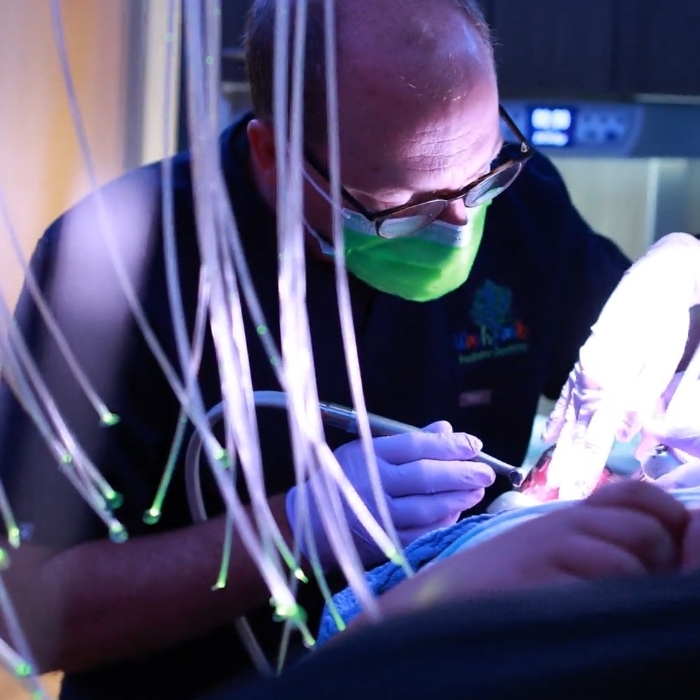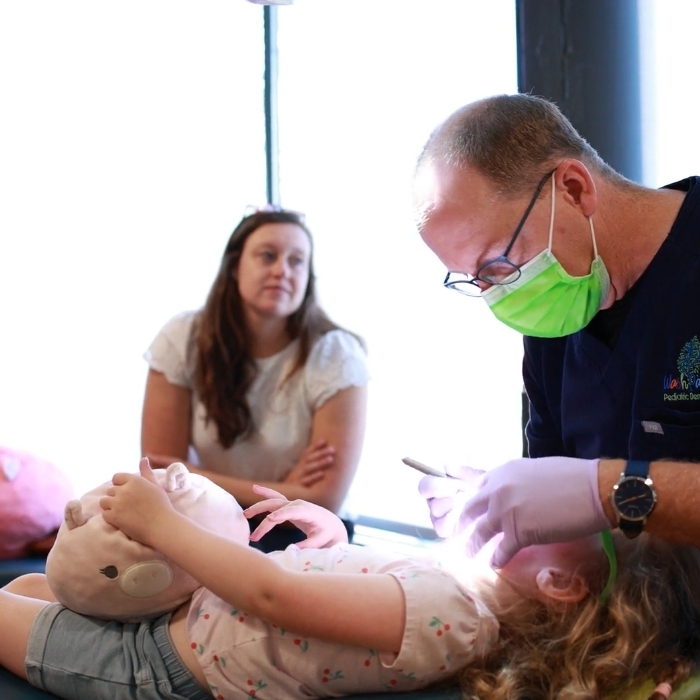Pulp Therapy Denver
Rescuing Teeth with Comfortable and Effective Care

When a child is experiencing major tooth discomfort from decay or they’ve recently had a serious dental injury that left their tooth significantly damaged, our team wants you to know that your child’s care is in good hands. With root canal treatment or pulp therapy in Denver, we can often treat, restore, and save natural teeth. We’ll always make sure that your child is feeling comfortable and explain all of the steps of the process for pulp therapy beforehand. If your child has a damaged tooth and needs treatment, contact our dental office today!
Why Choose Wash Park Pediatric Dentistry for Pulp Therapy?
- Dedicated to Working with Kids with Sensory Care Needs
- Pediatric Dentist with Over 10+ Years of Practice Experience
- Partnered with Children’s Sedation Experts
Does My Child Need Pulp Therapy?
Often, it is quite clear if your child needs to have pulp therapy performed because they will likely have oral discomfort. Even if the source of the pain is not visible, there are many signs to keep in mind moving forward. They include:
- Nighttime pain
- Constant unexplained pain
- Swelling or redness around the affected tooth
- Sensitivity to warm or cool food temperatures
- Looseness or mobility of the affected tooth
When you arrive at our dental office, Dr. Patrick will take the time to closely examine your child’s mouth and confirm the best course of action moving forward. This may include a pulpotomy or a pulpectomy, depending on the condition of the pulp itself, the type of tooth, and the extent of the damage.
The Pulp Therapy Process

Regardless of the type of pulp therapy, the procedure will get rid of infected pulp tissue in the center. A pulpotomy only addresses the pulp in the crown, which is why it is commonly used for baby teeth. Primary teeth tend to have very shallow roots. For more severe cases in adult teeth, a pulpectomy entails removing the entire pulp, including that in the root structure(s).
We start by giving your child a numbing agent. The local anesthetic will eliminate their pain and prevent them from feeling discomfort during the procedure. If necessary, we can also provide sedation, which can help them stay calm, still, and relaxed. We will then take away the damaged or infected tooth structure and clean the inner chamber before sealing it off. Finally, we’ll put a restoration (either a crown or filling) on the tooth. It’ll be just as good as new!
The Benefits of Pulp Therapy
Perhaps you’re wondering if your child would be better off simply having the tooth removed, especially if it’s a baby tooth. However, it’s almost always more beneficial to save the natural tooth than to remove it prematurely. Baby teeth serve as necessary placeholders for developing adult teeth. Without them, permanent teeth can erupt even more misaligned than they would otherwise.
Even with dental implants or bridges available, it’s smart to preserve natural adult teeth as well. First of all, your child likely won’t be a candidate for an implant until their mouth finishes developing, usually around age 18. Second, although prosthetic teeth have come a long way, they still don’t quite compare to the real thing. If the tooth can be saved through pulp therapy, it is worth doing it for your child.
Understanding the Cost of Pulp Therapy

Unlike ticket admission or items at the store, there isn’t a fixed, one-size-fits-all price for pulp therapy because circumstances can differ from case to case. What we can tell you is that paying for your child’s pulp therapy when they need it is well worthwhile. Our team will do everything we can to make the payment process as clear, easy, and stress-free as possible.
Factors That Can Affect the Cost of Pulp Therapy
The price of your child’s treatment depends on several considerations, including what kind of tooth it is (either primary or adult), where in the mouth it’s located, how deeply infected the tooth is, and the number of teeth being treated. Before we begin the procedure, we will explain the amount and can answer any questions you may have about the cost.
Is it Cheaper to Extract My Child's Tooth?
In some situations, such as if your child is already in or close to the window when a baby tooth should come out, it may make more financial sense to remove the tooth rather than perform pulp therapy.
However, in others, such as for a permanent tooth or if your child has a long time before the primary tooth is supposed to fall out naturally, it is almost always more cost-effective to save the tooth. In either of these scenarios, more treatment is necessary (e.g., tooth replacement or space maintainers, respectively), adding to the overall cost you pay.
Does Dental Insurance Cover Pulp Therapy?
Generally, dental insurance does have benefits for pulp therapy, but the exact coverage may vary from policy to policy. Most of the time, insurance pays about half of the cost, leaving the other half for you to pay out of pocket. Our front desk team will examine your plan and see how we can best take advantage of the benefits you have available.
Other Options for Making Pulp Therapy Affordable
Whether or not you have dental insurance benefits, paying for pulp therapy upfront may not fit into your budget. Or perhaps you would feel more comfortable financially if you could pay over time instead of all at once. In this case, we can set you up for financing, which breaks up your total into smaller monthly installments. We don’t want concerns about cost to hold you back from the treatment your child needs to have a healthy, happy smile.
